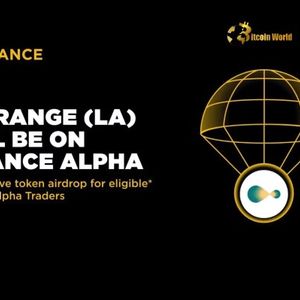BitcoinWorld CZ Proposes Revolutionary Dark Pool DEX to Combat MEV In the fast-paced world of cryptocurrency trading, challenges like Maximal Extractable Value (MEV) and front-running can significantly impact profitability, especially for large traders. Recently, former Binance CEO Changpeng Zhao ( CZ ) took to social media platform X to float a potentially game-changing idea: the creation of an on-chain dark pool-style decentralized exchange (DEX) specifically designed for perpetuals. What is CZ Proposing with a Dark Pool DEX? Changpeng Zhao’s suggestion centers around adapting the concept of a ‘dark pool’ from traditional finance to the decentralized landscape. In conventional markets, dark pools are private forums for trading securities, where participants can place large orders without publicly revealing their intentions until the trade is executed. This helps prevent market impact and front-running. CZ envisions bringing this concept on-chain. His core proposal involves mechanisms to obscure or delay the visibility of large orders or even the initial smart contract deposits associated with them. This could potentially be achieved using advanced cryptographic techniques like Zero-Knowledge (ZK) proofs or similar encryption methods, allowing trades to be validated on the blockchain without revealing sensitive order details publicly beforehand. Understanding the Problem: MEV and Crypto Front-Running Why is such a system necessary? The transparency inherent in public blockchains, while a strength, also creates vulnerabilities. When a large order, such as CZ ‘s hypothetical $1 billion buy, is submitted to a standard decentralized exchange, it often becomes visible in the transaction mempool before being processed. This visibility allows sophisticated bots and traders to detect the impending large trade. This is where MEV and Crypto Front-Running come into play. Front-running occurs when a bot or miner sees a pending transaction and places its own order ahead of it to profit from the expected price movement the large order will cause. MEV is a broader term encompassing various strategies where miners or validators can extract value by reordering, censoring, or inserting transactions within blocks. Both practices can lead to increased slippage, higher trading costs, and unfair advantages, particularly hurting traders executing substantial positions. How a Dark Pool DEX Could Combat MEV The primary goal of an on-chain dark pool would be to directly Combat MEV and front-running by removing the visibility that enables these attacks. By hiding the details of large orders or the intent behind a transaction until after execution, traders could potentially execute significant volume without alerting predatory bots or actors looking to exploit their trade. Consider the $1 billion example: on a standard DEX, seeing such an order hit the mempool would likely trigger a flurry of front-running bots. In a dark pool setup, if the order details or even the transaction’s nature were hidden via ZK proofs or delayed visibility, these bots wouldn’t have the necessary information to act preemptively, thus allowing the large order to execute closer to the expected price. The Mechanics: Hiding Orders and On-Chain Trading Implementing a dark pool on a decentralized network presents unique technical challenges. Standard On-Chain Trading relies on the public ledger for transparency and verification. Hiding information seems counter-intuitive to this design. Potential mechanisms discussed include: Hidden Order Books: Instead of a publicly viewable list of buy and sell orders, orders are submitted privately and matched off-chain or within a secure enclave before being settled on-chain. Delayed Transaction Visibility: Transactions might be submitted but only become fully visible or understandable on the public chain after they have been included in a block and executed. Zero-Knowledge Proofs (ZKPs): ZKPs could allow the system to prove that an order meets certain criteria (e.g., the user has sufficient funds, the price is within a valid range) without revealing the specific details of the order itself (like exact size or price). Encrypted Mempools: Research is ongoing into methods to encrypt transaction data in the mempool, which can only be decrypted by validators under specific conditions, potentially reducing front-running opportunities. These methods aim to preserve the benefits of On-Chain Trading – censorship resistance, self-custody, and transparency of *settlement* – while mitigating the drawbacks related to order book transparency. Benefits and Challenges of CZ’s Idea CZ’s suggestion sparks an interesting debate. Here are some key points: Potential Benefits: Reduced Slippage: Large orders are less likely to move the market against the trader before execution. Lower Costs: Mitigating MEV and front-running can lead to better execution prices and reduced effective trading costs. Attracting Large Traders/Institutions: Dark pools are common in traditional finance for large block trades. An on-chain equivalent could attract significant capital hesitant to trade on fully transparent DEXs due to MEV concerns. Improved Market Depth: Facilitating large trades could potentially lead to deeper liquidity pools over time. Potential Challenges: Transparency Concerns: Goes against the ethos of radical transparency central to many in the DeFi community. How can users trust a system where not all information is public? Implementation Complexity: Implementing robust ZK or other encryption methods securely on-chain is technically challenging and expensive. Risk of Manipulation: While different from traditional dark pools, concerns about price discovery and potential for manipulation (even if settlement is public) might arise. Liquidity Fragmentation: Adding another type of venue could potentially fragment liquidity further across the DEX landscape. As CZ himself noted, while some argue that full transparency helps market makers absorb large orders efficiently, different traders have different needs and preferences regarding market structure. A dark pool option caters specifically to those prioritizing anonymity for size over public price discovery. Why This Matters for Crypto Traders For everyday crypto traders, the prevalence of Crypto Front-Running and MEV might seem like an abstract problem, but it affects everyone. It contributes to network congestion, can cause unexpected price jumps or drops around your trades, and fundamentally represents a tax on market participants extracted by sophisticated actors. CZ’s idea highlights the ongoing effort within the decentralized finance space to build more robust, fair, and efficient markets. While a dark pool DEX might primarily benefit large players initially, successful solutions to Combat MEV could ultimately lead to a healthier trading environment for all participants on-chain. Conclusion: A Bold Idea for On-Chain Trading Changpeng Zhao’s suggestion of an on-chain dark pool DEX is a thought-provoking concept that directly addresses one of the most persistent problems in decentralized finance: MEV and front-running. By proposing methods to hide or delay the visibility of large orders, the aim is to create a safer environment for significant capital flows, potentially unlocking new levels of liquidity and participation in On-Chain Trading . While the technical hurdles and philosophical debates surrounding transparency are significant, the conversation initiated by CZ underscores the innovation needed to evolve DEXs. Whether dark pools become a standard feature of decentralized exchanges remains to be seen, but the pursuit of effective ways to Combat MEV is crucial for the future growth and integrity of the DeFi ecosystem. To learn more about the latest crypto market trends, explore our article on key developments shaping decentralized finance and institutional adoption. This post CZ Proposes Revolutionary Dark Pool DEX to Combat MEV first appeared on BitcoinWorld and is written by Editorial Team















